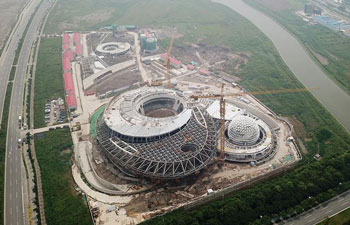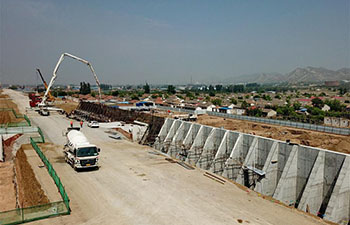ADEN, Yemen, June 14 (Xinhua) -- Yemen's internationally-backed President Abd-Rabbu Mansour Hadi landed in the port city of Aden on Thursday, an airport source told Xinhua, coming back from Saudi Arabia's capital of Riyadh after one year of his leaving the country.
The airport source said that Hadi returned to Aden just few hours after the arrival of Prime Minister Ahmed Obeid bin Daghr along with his ministers and other high-ranking officials in Aden's International Airport.
A number of governors and local military leaders gathered at Aden's International Airport to greet Hadi amid heavy deployment of armored vehicles and elite soldiers in the area, the source said anonymously.
A presidential source told Xinhua that President Hadi would spend the Muslim holiday of Eid-ul-Fitr with Yemeni citizens in the city of Aden.
President Hadi will closely oversee the ongoing military operations aimed at liberating Hodeidah from Houthis from the Joint Operations Room based in Aden, according to the presidential source.
The Houthis aligned with Iran launched a large military campaign and seized the capital Sanaa in late 2014, forcing Yemen's Hadi and his government to flee into the southern port city of Aden.
Subsequently, the pro-Houthi forces backed by armored vehicles attacked Aden and shelled Hadi's Republican Palace, leading him to escape again into exile in neighboring Suadi Arabia.
Saudi Arabia with other Arab countries intervened militarily and began pounding the Houthi-controlled capital Sanaa in March 2015 in response to an official public request from Hadi to protect Yemen and roll back Iran's influence.
The internal military conflict between the Iranian-backed Houthis and the Saudi-backed Yemeni government recently entered its fourth year, aggravating the suffering of Yemenis and deepening the world's worst humanitarian crisis in the country.
The ongoing fighting between the two warring rivals with daily Saudi-led airstrikes plunged the most impoverished Arab country in the Middle East into more chaos and violence.
Three quarters of the population, or more than 22 million people, urgently require some form of humanitarian help, including 8.4 million people who struggle to find their next meal.

















